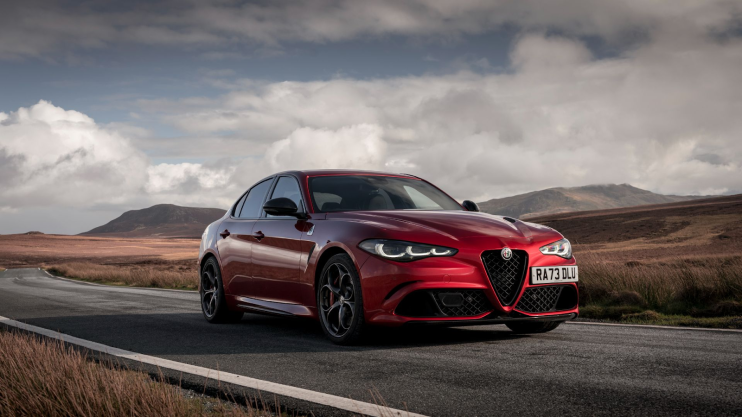Alfa Romeo Giulia Quadrifoglio review: A blast from the fast

After nine years, the Alfa Romeo Giulia Quadrifoglio should probably be shuffling off arthritically into the sunset. Instead, this old stager has come out fighting, with a second facelift designed to keep it competitive with the BMW M3 and Mercedes-AMG C63. A case of too little, too late?
The Guilia has always been beautiful, so thankfully the updates for 2024 are mostly beneath its skin. The only noticeable differences are the fussier new headlights, each inset with three LED swooshes that evoke the classic Alfa Romeo SZ. Or so it says here.
Power from the 2.9-litre twin-turbo V6 – itself derived from Ferrari’s ‘F154’ V8 – rises slightly to 520hp, while the steering and damping have been retuned. The big news, however, is a mechanical limited-slip differential, which replaces the electronic torque vectoring item of old. As we’ll see, it energises how the Quadrifoglio drives, encouraging this veteran super saloon to grow old disgracefully.
Looks that thrill
I don’t normally dwell on how a car looks, but the Giulia is so achingly gorgeous that you’re tempted to sell your grandmother and do the deal – £79,495, or around £700 a month with a hefty £20k deposit – before it even turns a wheel.
From the offset front number plate to those voluptuous haunches, filled out by elegant ‘telephone dial’ alloys, it’s hands-down the most handsome saloon car on sale. And vastly more attractive than the beaver-toothed BMW M3.
The Alfa’s aesthetics are helped by a fantastic range of paint colours, including vibrant Etna Red (seen in these press photos), deep Misano Blue (worn by my test car) and vibrant Montreal Green.
Options are mostly limited to a spicier Akrapovic exhaust (£3,500), lightweight wheels (£750), a carbon fibre roof (£2,000), carbon-ceramic brakes (a whopping £6,000), Sparco hard-shell seats (£3,250) and red-painted brake callipers (£450). Frankly, you don’t really need any of them.
Inside the Giulia Quadrifoglio
Inside is where the Giulia feels its age, with a dated media system and hard, scratchy plastics that definitely wouldn’t pass muster in Munich or Stuttgart. The new ‘open-grain’ carbon fibre trim looks odd, too.
On the plus side, as cars get ever more complicated, and more reliant on touchscreen tech, there’s a refreshing simplicity to the Alfa’s interior. It has proper physical buttons, straightforward phone connectivity, tactile metal shift paddles and a low-slung driving position. For a sports car, these are attributes that matter more.
Sadly, Alfa Romeo never built a Sportwagon (estate) version of the Giulia, but the Quadrifoglio is spacious enough, despite its limited rear legroom, to serve as a fast family car. If you need more practicality, the Stelvio Quadrifoglio drops the same 520hp V6 into a four-wheel-drive SUV – and doesn’t sacrifice much in terms of driving fun.
A not-so-quiet riot
Ah yes, driving fun. That’s why we’re here, rather than in a base-model Giulia 2.0 petrol, after all. And the Quadrifoglio – Italian for ‘four-leaf clover’, a good-luck symbol originally used on Alfa Romeo racing cars – doesn’t disappoint. It’s an absolute riot.
Even with the standard quad-tailpipe exhaust, the V6 emits a rich burble on start-up, which swells to a hard-edged snarl as the needle sweeps towards 7,000rpm. It doesn’t have the aural pomp and bombast of an AMG V8, but then neither does the new four-cylinder hybrid C63…
At 1,660kg, the Alfa Romeo also weighs fully half-a tonne less than the Mercedes, and 145kg less than a BMW M3 Competition. Off the line, it will slingshot to 62mph in 3.9 seconds and keep accelerating until 191mph. But it’s how the rear-driven Giulia goes around corners that really sets it apart.
Engage Race mode
There are four drive settings, including an all-guns-blazing Race mode that switches off the electronic stability control. Activate it on a wet road at your peril.
Even in second-rung Dynamic mode, the rear-driven Alfa can easily be coaxed into going sideways. But where the old car occasionally felt inconsistent, the new mechanical diff delivers a wonderfully linear response. Simply aim the nose, then adjust your angle of attack with your right foot.
You don’t need to slip-n-slide beyond the limits of the Pirelli P-Zero Corsa tyres to enjoy yourself, either. The Giulia’s steering is light and direct, and its suspension – double wishbones at the front, multi-link at the rear – delivers a fluid ride that is well matched to British roads.
Best of all, you sense the car’s lightness in every action and reaction. While other super saloons can feel like instruments of brute force, the Quadrifoglio has a deftness that rewards its driver on a deeper level. The more time I spent behind the wheel, the more I enjoyed it.
Verdict: Alfa Romeo Giulia Quadrifoglio
Downsides? Well, the eight-speed automatic gearbox isn’t as sharp as dual-clutch alternatives, and quoted fuel economy of 28mpg is a distant dream if you drive con brio.
There’s also a question mark over reliability – the last Quadrifoglio I borrowed, several years ago, locked itself with the keys inside the car – but Alfa insists that any issues have now been worked through. Feedback from owners on social media seems very positive, too.
Alfa Romeo plans to go fully electric by 2027, so this really is a final curtain call for the Giulia Quadrifoglio. In many respects, it already feels like a blast from the past, but in the finest possible way. Better than an M3 or C63, though? For me, absolutely yes.
Alfa Romeo Giulia Quadrifoglio
PRICE: £79,495
POWER: 520hp
0-62MPH: 3.9sec
TOP SPEED: 191mph
FUEL ECONOMY: 28.0mpg
CO2 EMISSIONS: 229g/km
• Tim Pitt writes for Motoring Research